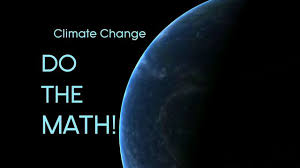The economics of capitalism has taught us to almost blindly accept one very dominant principle, “more is better”. More than last month, more than last year and more than last decade is good, a sign of success. This idea creeps into most other parts of our lives whether we know it or not: a more expensive car, a bigger more expensive house, etc. We subconsciously accept it and hardly pay attention. But there are parts of our lives where this fascination becomes destructive, even as we are presented with ample warning signs. Climate change is our most dramatic example of this as we ignore signs and the science, instead pursuing more and more fossil fuels, expanding changes in earth’s climate that may soon be non-reversible.
Since the Paris Climate Treaty and now with the US elections approaching we have lost the little most awareness of impending dangers of climate change. Instead we notice that gas prices are staying relatively low and that means we can use more. Connecting dots from our actions to corresponding consequences is a seldom practiced art. In the article found in an article from The New Republic, Bill McKibben from 350.0rg tells us “The numbers on global warming are even scarier than we thought”. McKibben’s approach with the public is simple, he tells his story with simple math. In order to have a chance a deflecting catastrophic climate change we must keep atmospheric temperatures from rising more than 2 degrees Celsius. For years, he has been saying we are dangerously near that limit.
In this article McKibben (and new scientific studies) bluntly tell us: “If we’re serious about preventing catastrophic warming, the new study shows, we can’t dig any new coal mines, drill any new fields, build any more pipelines. Not a single one. We’re done expanding the fossil fuel frontier. Our only hope is a swift, managed decline in the production of all carbon-based energy from the fields we’ve already put in production.” Time after time McKibben and science tell us how bad things are, suggest actions, we do little and the next reports reflect that things are then worse. We are having trouble dealing with the reality that we may finally have to settle for “less” if we want to avoid total collapse.
Four years ago, climate change research “showed that the untapped reserves of coal, oil, and gas identified by the world’s fossil fuel industry contained five times more carbon than we can burn if we want to keep from raising the planet’s temperature by more than two degrees Celsius.” This was shocking and we finally started to do something, as “that math kicked off a widespread campaign of divestment from fossil fuel stocks by universities, churches, and foundations” and other steps in the right direction. We made some small steps forward, but emphasis here is on small. However the math of these new studies is even more explosive, emphasizing the inadequacy of our actions.
The scary facts, according to the article is as follows: “Scientists say that to have even a two-thirds chance of staying below a global increase of two degrees Celsius, we can release 800 gigatons more CO2 into the atmosphere. But the Rystad data shows coal mines and oil and gas wells currently in operation worldwide contain 942 gigatons worth of CO2.” McKibben goes on to explain the details behind this “current” math of climate change. He says the math problem is simple. For more on these details you must read the article by McKibben.
It is important to remember, emphasize and relate to others McKibben’s concluding statement: “We’re done expanding the fossil fuel frontier. Our only hope is a swift, managed decline in the production of all carbon-based energy from the fields we’ve already put in production.” As of the 2nd debate, the presidential debates have not had a single question about climate change and our “news media” seldom go further than asking if someone believes climate change is real. This must change. We must learn that more is not always better and eventually the consequences must be paid, too often by someone else. Get ready future generations.
https://newrepublic.com/article/136987/recalculating-climate-math
